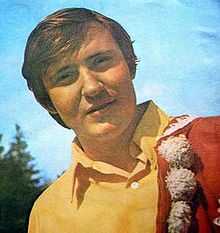Volodymyr Ivasyuk
| Volodymyr Mykhailovych Ivasiuk Володи́мир Миха́йлович Івасю́к | |
|---|---|
 Volodymyr Ivasyuk in 1972 | |
| Born |
March 4, 1949 Kitsman, Chernivtsi oblast, Ukrainian SSR |
| Died |
May 18, 1979 (aged 30) Lviv, Ukrainian SSR |
| Occupation | Poet and composer |
| Nationality | Ukrainian |
| Period | 1970-1979 |
Volodymyr Mykhailovych Ivasyuk or Volodymyr Ivasiuk (Ukrainian: Володи́мир Миха́йлович Івасю́к) (March 4, 1949 – May 18, 1979) was a very popular Ukrainian songwriter, composer and poet. He is the author and composer of the widely popular song "Chervona Ruta" popularized by Sofia Rotaru in 1971, and later covered by other singers.
Biography
Ivasyuk was born in the city of Kitsman, Chernivtsi Oblast, on March 4, 1949. His father Mykhaylo Ivasyuk was a well-known writer from Bukovyna. His mother Sofiya Ivasyuk, from the Zaporizhia Oblast by birth, was a teacher in a local school. He had two sisters, Halyna (b. 1943) and Oksana (b. 1960). As early as the age of five, Volodymyr began learning to play the violin at a music school. Later, he learnt to play the piano as well. In 1964 he created an ensemble - "Bukovyna" - in his school and wrote their first songs, the first of which was "Lullaby".
After Volodymyr had already graduated from secondary school, his family moved to the city of Chernivtsi where his father was offered a teaching position at the Bukovinian State Medical University. Volodymyr went on to study at the Lviv Medical Institute while he continued his musical career. He joined the "Karpaty Ensemble" at a local community centre and played the violin and offered his songs to be performed.
He became an overnight national sensation in the Soviet Union, after a public performance on September 13, 1970 of his compositions "Chervona Ruta" (Ukrainian for 'Red Rue') and "Vodohray" with Olena Kuznetsova. This performance took place in a theatre in Chernivtsi and was televised throughout the USSR.
Ivasyuk’s fame became viral. In 1971 his "Chervona Ruta", performed live in Moscow with along fellow Chervona Ruta co stars Vasyliy Zinkevych and Nazary Yaremchuk, and won the Best Song of the Year award of the Soviet Union. His composition "Vodohray" won the best song award the next year as well. Particularly "Chervona Ruta", sung by Sofia Rotaru was featured in the musical-film "Chervona Ruta", directed by Roman Oleksiv.
Ivasyuk moved to Lviv to formally study composition at the Lviv Conservatory of Music. Upon graduation from the medical institute, he worked as a doctor, and joined the post-graduate courses at the Department of Pathological Physiology to work for his next degree. In Lviv Volodymyr created the songs: "I am your wing", "Two rings", "Ballad about mallow", "Ballad about two violins". All these songs and other works of Ivasyuk were premiered by Sofia Rotaru.
On May 18, 1979 Ivasyuk was found hanged in a forest located on the outskirts of Lviv. The official cause of death was listed as suicide but the most suspect his suicide was staged by the KGB because of the political nature of his songs. He is buried at Lychakivskiy Cemetery.
His celebrity status in the Soviet Union and his cultural contributions in general, and Ukrainian in specific, drew the attention of Soviet authorities. His songs, mostly about love to geographical features and regional customs, were perceived as rousing nationalist sentiment in listeners. His mutilated body was discovered in a woods outside Lviv about three weeks after he had been murdered. The circumstantial evidence points to the KGB as the perpetrator of the slaying. Ivasiuk's funeral was attended by over 10,000 people. After his death his compositions were removed from a period from sale and radio play.
Among the legacy left by Ivasyuk was the first Soviet rock-opera, whose scenario and songs were specifically written for performance by Sofia Rotaru.[1][2]
In 2009, President Victor Yushchenko awarded Ivasyuk the Hero of Ukraine medal posthumously. The President also reopened the criminal investigation into Ivasyuk's death.
Remembrance
There is a museum in Chernivtsi dedicated to preserving his memory and he has statues in Lviv and Kitsman.[3]
References
External links
|